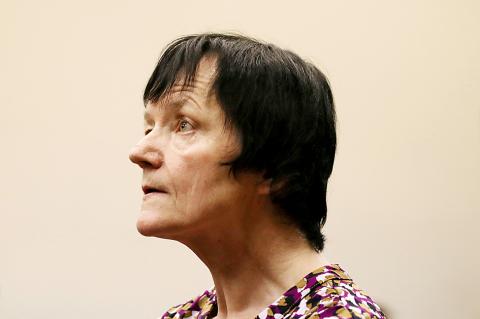A former employee of Denmark’s social services on Tuesday was sentenced to six–and-a-half years in prison for embezzling millions in funds, meant for people in need, over decades.
Britta Nielsen, 65, was accused of diverting 117 million Danish kroner (US$16.9 million at the current exchange rate) between 1993 and 2018 from the social services to her personal bank accounts by creating fictitious projects.
In its verdict, the Copenhagen court found Nielsen guilty of “fraud of a particular grave nature ... abusing a public position and forgery of a particular grave nature.”

Photo: Reuters
The sentence is one of the longest handed down for economic crimes in the country, Danish media said.
Prosecutors had requested at least eight years in prison, claiming that she had abused her position as a public servant.
“She has betrayed the trust she was given when she became employed by the National Board of Social Services,” prosecutor Lisbeth Jorgensen told the court during the trial.
Nielsen, who was employed by the social services agency for 40 years, admitted to the fraud, but not the amount of money suggested by the prosecution.
During the trial, she said that she had been drawn into a “vicious circle” and claimed she had acted to improve the lives of her three children, who have also been charged with the handling of stolen goods.
Her lawyer, Nima Nabipour, had asked for a sentence of four to six years, arguing that crimes committed before 2009 have reached their statute of limitations.
However, the court found her liable for the embezzling of the full 117 million kroner.
Nabipour has also pleaded mitigating circumstances, such as Nielsen’s age and health.
The trial has had to be adjourned several times due to Nielsen collapsing in court and being too ill to stand trial.
However, a medical examination found her to be in good health.

The collapse of the Swiss Birch glacier serves as a chilling warning of the escalating dangers faced by communities worldwide living under the shadow of fragile ice, particularly in Asia, experts said. Footage of the collapse on Wednesday showed a huge cloud of ice and rubble hurtling down the mountainside into the hamlet of Blatten. Swiss Development Cooperation disaster risk reduction adviser Ali Neumann said that while the role of climate change in the case of Blatten “still needs to be investigated,” the wider impacts were clear on the cryosphere — the part of the world covered by frozen water. “Climate change and

Poland is set to hold a presidential runoff election today between two candidates offering starkly different visions for the country’s future. The winner would succeed Polish President Andrzej Duda, a conservative who is finishing his second and final term. The outcome would determine whether Poland embraces a nationalist populist trajectory or pivots more fully toward liberal, pro-European policies. An exit poll by Ipsos would be released when polls close today at 9pm local time, with a margin of error of plus or minus 2 percentage points. Final results are expected tomorrow. Whoever wins can be expected to either help or hinder the

DENIAL: Musk said that the ‘New York Times was lying their ass off,’ after it reported he used so much drugs that he developed bladder problems Elon Musk on Saturday denied a report that he used ketamine and other drugs extensively last year on the US presidential campaign trail. The New York Times on Friday reported that the billionaire adviser to US President Donald Trump used so much ketamine, a powerful anesthetic, that he developed bladder problems. The newspaper said the world’s richest person also took ecstasy and mushrooms, and traveled with a pill box last year, adding that it was not known whether Musk also took drugs while heading the so-called US Department of Government Efficiency (DOGE) after Trump took power in January. In a

It turns out that looming collision between our Milky Way and Andromeda galaxies might not happen after all. Astronomers on Monday said that the probability of the two spiral galaxies colliding is less than previously thought, with a 50-50 chance within the next 10 billion years. That is essentially a coin flip, but still better odds than previous estimates and farther out in time. “As it stands, proclamations of the impending demise of our galaxy seem greatly exaggerated,” the Finnish-led team wrote in a study appearing in Nature Astronomy. While good news for the Milky Way galaxy, the latest forecast might be moot